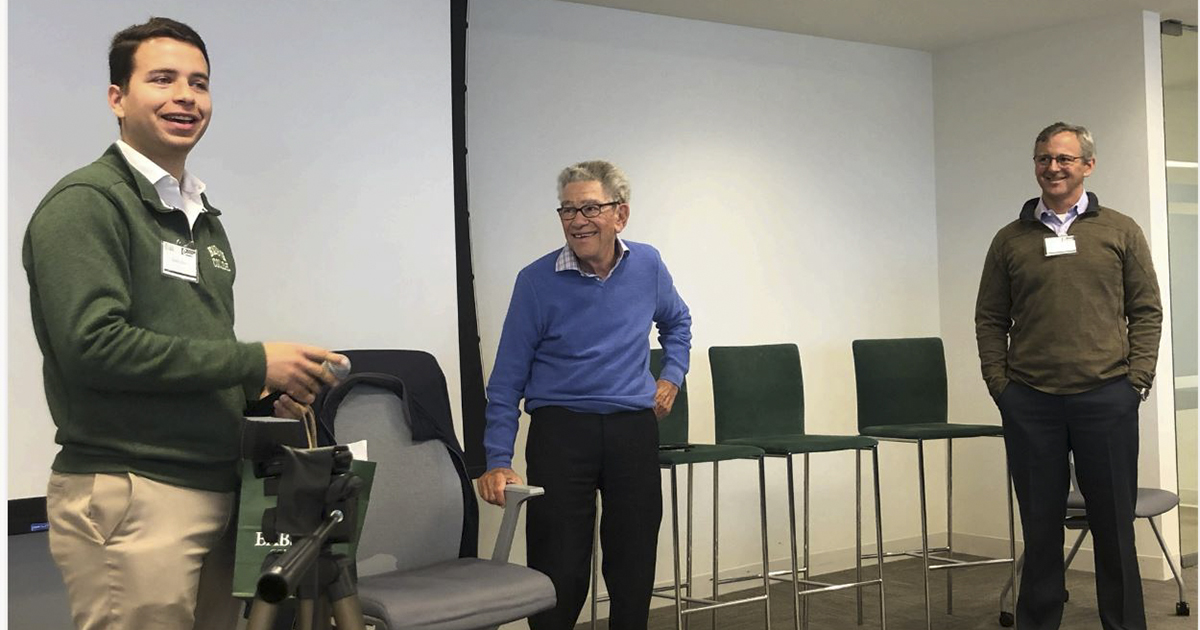What Is Entrepreneurial Acquisition, and Why Is It Booming?

There’s a different kind of ETA gaining traction at Babson College, and it’s a compelling—and popular—twist on Babson’s signature Entrepreneurial Thought & Action® (ET&A™) methodology.
What is Entrepreneurial Acquisition?
It’s called entrepreneurship through acquisition (ETA), and while it’s not new, it’s surging in popularity as a different path to entrepreneurship. For those able to purchase an existing small business, ETA, or entrepreneurial acquisition, provides a path to becoming an entrepreneur without starting from scratch, Babson Adjunct Lecturer John Hallal said.
“Entrepreneurship through acquisition is a great way to create wealth for a number of reasons,” Hallal said. “First, the entry costs are relatively low. Second, the returns can be high. Third, there is a growing pool of businesses for sale.”
Emilio Ruiz Padilla MBA’23, who founded Babson’s Entrepreneurship Through Acquisition Club last year, originally dreamed of building his own business from the ground up. He learned about entrepreneurship through acquisition during his first semester at Babson and hasn’t looked back.
READ MORE about entrepreneurship through acquisition and the entrepreneurial journey of a Babson College alumnus who, instead of launching a new business, built up an existing one.
“Usually when you think about entrepreneurship, you think about starting from scratch and courting venture capitalists,” Ruiz said. “Once people realize that they can be an entrepreneur without starting a new business, that they can acquire something and grow it, they want to know more.”
Ruiz connected with many interested classmates and Babson alumni who already were interested in buying a small business.
“That’s when I realized there’s something interesting here that everyone needs to hear about,” Ruiz said. “I realized there was a whole community at Babson just waiting to be leveraged.”
Entrepreneurship Through Acquisition Conference
Ruiz attributes ETA’s growing popularity to a so-called “silver tsunami,” a wave of retiring Baby Boomers seeking a secure future for their small businesses. Meanwhile, many recent graduates are looking for an alternative to the well-known avenues to entrepreneurship.

ETA carries a lot less risk than the average startup, Babson Adjunct Lecturer John Hallal said.
“There are a lot of young MBAs that don’t really want to follow the traditional path of getting a consulting job, then getting the private equity role, then becoming business owners,” Ruiz said. “They want to be CEOs, but they don’t really want to go through all the struggles of the startup journey.”
Those who pursue a business acquisition also face far better odds, with roughly 90% of startups failing within the first year.
Interest in ETA continues to grow at Babson. The ETA Club recently announced an October 20 Entrepreneurship Through Acquisition Conference slated to include successful acquisition entrepreneurs from throughout the Babson community.
“These aren’t just any alumni, these are folks who were once in the trenches searching for companies to invest in, and are now sitting in the CEO seat,” read the ETA Club announcement.
Entrepreneurial Acquisition Basics
The kind of business acquired is key to ETA success, said Hallal. Searchers need a business that is already profitable so they can jump right in and focus on operating the company. The cash flow will help pay off the debt used to buy the company and increase equity value.
“You want to focus on stable, traditional companies that have predictable revenue and cash flow,” Hallal said. “Some good examples of these types of businesses include services, distribution, or specialized software. One recent example is a specialty service company that cleaned windows for skyscrapers.”
Those interested in entrepreneurial acquisition usually conduct two fundraising campaigns, the first is to fund their search. They’ll need months to carefully investigate and identify a business that is a good fit. Once they’ve identified a business, they’ll need another round of fundraising to secure financing and negotiate the sale.
“There are more investors by the day and new searchers by the minute, so it’s a space that is starting to boom.”
Emilio Ruiz Padilla MBA’23
Hallal offered additional tips for those considering entrepreneurship through acquisition:
- Get the right advice. Talk to other searchers before embarking on your ETA journey. Network with investors and the search community as a whole. Connect with lawyers and accountants who are familiar with ETA and can help you navigate the process.
- Do your due diligence. Thoroughly investigate the business you are considering buying. This includes reviewing financial statements, talking to employees, and assessing the market.
- Be prepared to work hard. Buying a business is not a get-rich-quick scheme. It takes hard work and dedication to be a successful entrepreneur through acquisition.
Ruiz, who is attending Babson’s ETA conference in October, said anyone interested can connect with him or the Babson ETA Club.
“It’s something that’s becoming really popular right now,” Ruiz said. “There are more investors by the day and new searchers by the minute, so it’s a space that is starting to boom.”




